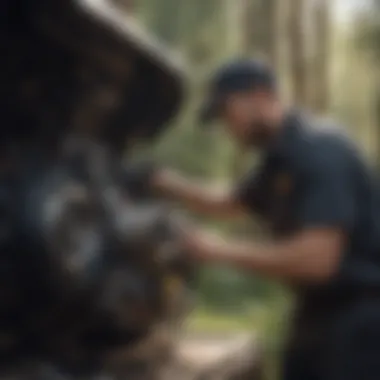Exploring Mechanics Careers and Opportunities in Arizona


Intro
Mechanics play a crucial role in maintaining the functionality and safety of vehicles. Arizona, with its growing population and diverse industries, offers many opportunities for aspiring mechanics. The job landscape in the state not only includes traditional auto mechanics but also specialized roles such as aircraft and motorcycle mechanics. Understanding the requirements and trends in this field can significantly enhance career prospects for those looking to enter the profession.
This article will explore the various aspects of mechanic jobs in Arizona, including the types of job roles available, educational pathways, and the impact of technology on the trade. The exploration aims to provide readers with a comprehensive view of the industry, beneficial for both newcomers and those already in the field.
Overview of Mechanic Jobs in Arizona
The landscape of mechanic jobs in Arizona is broad and multifaceted. Understanding this overview is crucial for both aspiring mechanics and employers alike. Arizona’s diverse automotive and industrial sectors create a demand for skilled workers, making it important to analyze current opportunities as well as long-term trends. Mechanic roles go beyond basic repairs; they involve technical expertise, problem-solving, and continuous learning, aligning with the evolving nature of the automotive industry.
Current Job Landscape
The job market for mechanics in Arizona has shown a steady recovery and growth in recent years. Many employers struggle to find qualified candidates, creating a favorable environment for job seekers. This could stem from the increasing complexities in vehicles, which require more specialized training and skills.
According to recent statistics, the sector employs thousands across various roles. Major cities like Phoenix and Tucson are hotspots for employment, offering positions in both small shops and large dealerships. The job landscape showcases a variety of work environments, each with distinct responsibilities and challenges.
Types of Mechanic Roles
Mechanic roles can be categorized into several types, each with unique responsibilities and qualifications. Below is a closer look at different types of positions:
Automotive Mechanics
Automotive mechanics focus primarily on the service and repair of cars and trucks. This role is crucial as it ensures vehicles remain safe and functional for drivers. One key characteristic of automotive mechanics is their familiarity with different car models and systems. This makes the position a popular choice for many due to its relatability and the direct impact on everyday life.
However, the unique feature of automotive mechanics lies in their continuous need to adapt. With the rise of electric and hybrid vehicles, mechanics must learn new technologies. The advantages include diverse job opportunities, but the challenges can be significant given the fast-paced changes in automotive technologies.
Diesel Mechanics
Diesel mechanics specialize in diesel engines, commonly found in heavy-duty vehicles like trucks and buses. This specialization is critical, as diesel engines require different maintenance and repair strategies compared to gasoline engines. The key characteristic here is the focus on larger vehicles, often linked to the transportation industry.
The unique feature of working as a diesel mechanic is the robust job security that comes with the role. However, technicians may need to deal with more physically demanding tasks and work late hours, which some may consider a disadvantage.
HVAC Technicians
HVAC technicians manage heating, ventilation, and air conditioning systems, both in residential and commercial properties. Their role is vital, especially in Arizona, where climate extremes can place significant demand on such systems. The key characteristic of HVAC work is its seasonality, where demand peaks in certain months.
A unique aspect of this role is the varied work environments. While some technicians may work indoors, others are out in the field solving problems on-site. The benefits include diverse tasks but learning various systems can be time-consuming for newcomers.
Motorcycle Mechanics
Motorcycle mechanics repair and maintain motorcycles, which have a dedicated following in Arizona. Key characteristics include a passion for bikes and specialized knowledge. This profession appeals to those who prefer working with smaller, intricate machines compared to larger vehicles.
The unique feature of motorcycle mechanics is the close relationship with clients who often have tailored requests. While this offers job satisfaction, the market size can limit opportunities compared to broader automotive roles.
Heavy Equipment Operators
Heavy equipment operators work with machinery used in construction and farming. This role is critical in Arizona, given the extensive construction activities in urban areas. The key characteristic of this role is the need for specialized training and certifications.
The unique feature of being a heavy equipment operator is operating large machinery that plays a key role in major projects. However, job sites can be hazardous, and safety remains a constant concern in the field.
Overall, these mechanics form the backbone of Arizona’s employment landscape, with each role presenting its own set of advantages and difficulties.
Industry Trends Affecting Mechanics
Understanding the industry trends affecting mechanics is crucial for anyone looking to establish a career in this field, particularly in Arizona. The fast-evolving landscape of automotive technology affects hiring needs, job functions, and the skills that are in demand. As new vehicles and technologies enter the market, mechanics must adapt to stay relevant. This section discusses the significant industry trends influencing job roles for mechanics in Arizona, focusing on two primary areas: technological advancements and shifts in employment demand.
Technological Advancements
The rise of technology in mechanics has profoundly changed the industry. Mechanics now require a more sophisticated skill set to diagnose and repair modern vehicles. This section examines notable technological advancements:
Electric Vehicles
Electric vehicles (EVs) have increasingly become a common topic in the automotive realm. With a focus on low emissions and energy efficiency, they are gaining preference among consumers and governments alike. The key characteristic of EVs is their electric drivetrains, which replace traditional internal combustion engines.
One significant advantage of EVs is their lower total cost of ownership over time. This includes savings on fuel and reduced maintenance costs. However, they come with unique features that may require mechanics to undergo specific training to handle high-voltage systems safely, representing both a challenge and an opportunity in the job market.


Hybrid Models
Hybrid models combine both gasoline engines and electric motors. This dual-functionality allows drivers to enjoy the benefits of lower emissions while retaining the convenience of traditional fueling options. The hybrid model's key characteristic is its ability to transition between electric and gasoline power seamlessly.
These vehicles have become increasingly popular, often making them a significant part of service work for mechanics. However, they can be complex, requiring mechanics to develop specific skills in both electrical and mechanical systems to work on them effectively.
Diagnostic Tools
The diagnostic tools available today have completely transformed the way mechanics assess vehicle issues. Modern vehicles are equipped with advanced onboard diagnostic systems that provide valuable real-time data. The key advantage of these tools is the speed at which they can pinpoint problems, allowing for more efficient repairs.
Mechanics must familiarize themselves with these tools to leverage their full potential. While the initial investment in diagnostic equipment can be significant, the efficiency gains and enhanced accuracy lead to higher customer satisfaction, making this a worthwhile consideration for any mechanic.
Shifts in Employment Demand
As mechanical work evolves, so too does the demand for specific skills within the industry. One notable shift is the increasing need for mechanics who can handle advanced technology and specialized repairs, particularly in sectors focused on sustainability. There is growing interest in green technologies and alternative fuels, which also influences the hiring trends.
Technological advancements create a ripple effect in employment demand. As electric and hybrid vehicles gain market share, the industry is likely to experience more job openings specifically targeting mechanics trained in these areas. Additionally, ongoing developments in automotive technology could lead to more specialized mechanic roles emerging.
"Stay abreast of industry trends and technology changes to remain competitive in the job market."
Mechanics must also be adaptable and willing to expand their skill set through training and experience in order to match the evolving needs of the marketplace.
Key Qualifications for Mechanics
The realm of mechanic jobs demands certain qualifications that can significantly influence career paths and advancements. Understanding these qualifications is crucial for anyone aspiring to enter the mechanic field in Arizona. They provide the framework for what employers expect and help in determining the readiness of candidates to meet the industry's challenges. Without these qualifications, aspiring mechanics may find themselves at a disadvantage in a competitive job market.
Educational Requirements
High School Diploma
A high school diploma serves as a fundamental requirement for most mechanic positions. It establishes a basic level of education that indicates the individual is prepared for further training. Many vocational programs and employers require this credential as a baseline. Importantly, subjects like math and physics can provide essential skills in understanding mechanical principles.
The high school diploma is a common starting point, making it a popular choice for many. Its requirement is relatively straightforward, and obtaining one can open the door to post-secondary education options. However, it does have some limitations, as simply having a diploma is often insufficient for career advancement.
Post-Secondary Training
Post-secondary training plays a pivotal role in preparing individuals for specific roles within the mechanic field. This training, often obtained through vocational schools or community colleges, focuses on both theoretical knowledge and practical skills. The programs available are designed to cover a range of topics, from basic automotive repair to advanced diagnostic techniques.
Post-secondary training is increasingly seen as beneficial since it provides targeted education that aligns with industry needs. It distinguishes candidates by showing a commitment to learning and professional growth. However, programs can vary significantly in quality, so thorough research into options is essential.
Apprenticeships
Apprenticeships are another crucial aspect of qualifications for aspiring mechanics. They offer hands-on experience under the guidance of seasoned professionals. This on-the-job training allows learners to apply skills in real-world settings, which is invaluable for developing competence.
The key feature of apprenticeships is their dual nature, combining paid work with ongoing training. This structure makes them a popular choice among many candidates. However, they can be competitive to secure, and the duration may delay full independence in the workforce. Regardless, the experience gained can set candidates apart when looking for employment.
Necessary Skills
Technical Proficiency
Technical proficiency is indispensable in any mechanic’s role. It encompasses the understanding and application of complex mechanical systems, tools, and technologies. A mechanic must navigate everything from engine diagnostics to circuit repairs efficiently.
Highlighting expertise in this area is vital. It indicates to employers that a candidate can effectively diagnose and solve mechanical problems and handle tools safely and competently. However, while technical skills are critical, the ever-evolving technology in vehicles may require continuous learning to keep up.
Problem-Solving Abilities
Problem-solving abilities stand out as an essential skill for mechanics. Mechanic work often involves diagnosing issues where symptoms may not clearly point to the root cause. Thus, being able to think critically and troubleshoot effectively is crucial in this field.
This skill set is beneficial in noting that a mechanic can not only find faults but also implement practical solutions. However, individuals with less experience may find this challenging initially, but with time and practice, they can hone their problem-solving aptitude.
Attention to Detail
Attention to detail is vital in mechanics, as overlooking small issues can lead to larger problems. Mechanics must focus intently on their work, whether it is inspecting an engine or ensuring all components are properly installed.
This characteristic marks a mechanic who is thorough and reliable. While such attentiveness can enhance the quality of work, it may sometimes lead to longer repair times, especially for those new to the environment. Yet, as mechanics build their skills, this attention can significantly improve efficiency and effectiveness.


Certifications and Licenses
A.S.E. Certification
Achieving A.S.E. (National Institute for Automotive Service Excellence) certification highlights a mechanic's professional knowledge and skills. The certification process covers various specialized fields and demonstrates a commitment to excellence in automotive repair and service.
Having this certification can greatly enhance employment prospects. Employers often look for certified mechanics as it assures them of the candidate's proven abilities. However, maintaining certification requires ongoing education and testing, which some may find demanding.
Specialized Certifications
Specialized certifications allow mechanics to gain recognition in niche areas, such as diesel engines, transmission repair, or air conditioning systems. This specific training shows an advanced understanding of particular technologies and can make a candidate more marketable.
Specialized certifications are beneficial for those looking to establish themselves in specific sectors of the mechanic field. However, the need for ongoing education may pose challenges for some, as they juggle work and study.
Licensing Requirements in Arizona
In Arizona, certain mechanic roles require specific licenses to practice legally. These requirements can vary based on the type of work performed. Licensing ensures that mechanics adhere to established state standards and regulatory practices.
Understanding these requirements is crucial, as they can directly impact employment. While obtaining a license is often viewed as a beneficial step that establishes credibility, the process can sometimes be a hurdle for new mechanics if they are not fully informed of the requirements.
Pathways to Education and Training
Understanding the various education and training pathways in mechanic jobs is crucial for individuals aspiring to enter this field, particularly in Arizona. The job market is continuously evolving, and obtaining the right qualifications and skills can significantly enhance employability. Many employers seek candidates with practical experience and specialized training, emphasizing the importance of structured education.
The focus is often on vocational schools, community colleges, and online learning options. These pathways offer flexibility, allowing students to tailor their education around personal commitments. Furthermore, they equip aspiring mechanics with essential knowledge and hands-on skills needed in the workforce.
In this section, we will discuss specific options available in Arizona.
Vocational Training Programs
Vocational training programs play a pivotal role in preparing individuals for mechanic jobs. These programs tend to be more focused compared to traditional education routes. Many vocational schools in Arizona offer targeted courses that cover various aspects of mechanics, including automotive repair, diesel technology, and HVAC maintenance.
Students typically engage in both classroom instruction and practical experience. This dual approach ensures they grasp theoretical concepts while also gaining hands-on experience. Moreover, most programs are relatively short, usually ranging from six months to two years, allowing quick entry into the workforce. Finding local vocational programs is relatively easy through a simple online search.
Community College Options
Community colleges are another excellent pathway for aspiring mechanics. They often offer associate degrees and certificates in automotive technology and related fields. Arizona's community colleges provide comprehensive programs that may include coursework on engine repair, electronics, and diagnostics.
One of the advantages of attending community college is the cost. Tuition fees are generally lower than those at four-year institutions. Additionally, community colleges frequently have strong ties with local businesses, which can facilitate internships and job placements. Students are encouraged to participate in hands-on labs and industry certification programs, ensuring their education meets the current demands.
Online Learning Resources
In today's digital age, online learning resources have become increasingly popular for those pursuing mechanic jobs. Online courses offer flexibility and the chance to learn at one's own pace. Various platforms provide modules on specific skills such as engine repair, system diagnostics, and safety protocols.
While traditional hands-on experience remains vital, online courses can supplement practical training. Many learners find that they can grasp foundational knowledge through these resources before attending vocational schools or community colleges. Websites such as Reddit and Facebook have groups dedicated to mechanics, where individuals can share experience and resources, enhancing the learning experience further.
"The transition to online education allows many aspiring mechanics to acquire skills that were once reserved for traditional classrooms, making education accessible to a broader audience."
Overall, the pathways to education and training in mechanic jobs in Arizona are diverse and flexible. Individuals have numerous options to develop the skills necessary for a successful career in this field.
Job Search Strategies
In the competitive environment of mechanic jobs in Arizona, having effective job search strategies is essential. These strategies can significantly improve the chances of securing a position that not only matches skills but also offers opportunities for growth. Employing the right approach can lead to meaningful employment and career advancement. It's important to understand how to navigate the job market effectively.
Utilizing Job Boards
Job boards serve as a crucial resource for job seekers in the mechanic industry. Websites such as Indeed, Monster, and ZipRecruiter offer a wide range of listings from various employers. Users can filter searches based on location, type of job, and specific skills.
Benefits of using job boards include:
- Access to a broad range of opportunities: They list positions from many employers, increasing visibility.
- Ease of application: Most job boards allow users to apply directly through the site, simplifying the process.
- Search Alerts: Many job boards offer notification services for new openings, keeping job seekers updated.
It is vital to keep profiles updated and to tailor each application to the specific job description. Personalizing resumes and cover letters helps in standing out among other candidates.
Networking Within the Industry


Networking is a valuable tool for those seeking mechanic jobs. Building relationships with industry professionals can lead to referrals and insider information on job openings. Engaging with others in the field facilitates learning about trends, necessary skills, and potential opportunities.
Ways to network effectively include:
- Attending industry events: Workshops, seminars, and trade shows serve as excellent venues to meet employers and fellow mechanics.
- Joining professional organizations: Associations such as the Automotive Service Association provide networking opportunities and resources for mechanics.
- Using social media platforms: LinkedIn can be particularly useful for connecting with industry experts and engaging with company pages.
Building a strong professional network may take time, but the rewards can be significant, providing access to unadvertised job openings.
Engaging with Local Employers
Engaging directly with local employers can yield substantial benefits for job seekers. Many positions are filled through direct applications rather than online postings.
Steps to effectively engage with local employers include:
- Researching local businesses: Understanding the landscape of mechanic shops, dealerships, and service centers can help tailor approaches.
- Visiting employers in person: Many small businesses appreciate the initiative. Bringing a resume and expressing interest can make a strong impression.
- Following up: After an initial inquiry or application, reaching out to express continued interest can remind employers of your candidacy.
Direct engagement with employers can open doors to opportunities not found on job boards. This proactive approach often leads to discussions about available positions before they are publicly advertised.
Effective job search strategies are essential for a successful career path in the mechanic industry. By utilizing job boards, networking, and engaging with local employers, candidates can navigate the job market more successfully, enhancing their chances of career advancement.
Career Growth Potential
The concept of career growth is significant in the context of mechanic jobs in Arizona. It encompasses various avenues through which individuals in this field can enhance their professional trajectory and improve their earnings. Understanding the potential for advancement helps aspiring mechanics make informed decisions about their education and career paths. In an evolving industry, recognizing these opportunities can provide an edge in a competitive job market.
Advancement Opportunities
Management Positions
Management positions offer a pathway for mechanics who aspire to lead teams and oversee operations. Those in management are responsible for not only ensuring service quality but also managing finances and personnel. This role is critical in larger workshops or dealerships. A key characteristic of management roles is the necessity for enhanced communication and organizational skills. It allows experienced mechanics to leverage their knowledge while stepping into leadership roles. Choosing this path provides financial rewards and a sense of influence within the company. However, it often involves administrative responsibilities that may deter some.
Specialized Technician Roles
Specialized technician roles focus on specific areas in the mechanic field, such as electrical systems or performance tuning. These positions are vital as they cater to a niche that requires in-depth knowledge and expertise. The appeal of specialized roles lies in their potential for higher pay and increased demand for specific skills. Mechanics in these roles can become essential resources within their shops, allowing them to command respect and higher salaries. However, entering specialized fields often requires additional training and certification.
Entrepreneurship
Entrepreneurship allows mechanics to use their skills to create their own businesses. Many find this path appealing due to the autonomy it provides in shaping their work environment. Owning a shop can lead to significant financial success if managed correctly. This option also offers the opportunity to build a brand and foster community relationships. However, starting a business includes risks and challenges, particularly in initial funding and maintaining a customer base.
Continuing Education Benefits
Continuing education plays a crucial role in enhancing a mechanic's career. As technology evolves, mechanics must adapt to new tools and techniques. Attending workshops, enrolling in certification programs, and participating in trade shows are ways to stay updated. The knowledge gained from these activities can improve job performance and open doors to advanced positions. Moreover, employers value workers who take the initiative to upgrade their skills, often leading to better job security and higher salaries.
"Mechanics who continuously learn are better prepared for the challenges in this fast-paced industry."
Overall, the potential for career growth in the mechanic field in Arizona can be significant. It involves a combination of practical experience, specialized education, and proactive career planning.
Challenges in the Mechanic Field
The mechanic profession is not without its hurdles. Identifying and understanding these challenges is crucial for individuals considering a career in this field. It allows potential mechanics to prepare adequately and adapt to the demands of the industry. Two significant challenges that affect mechanics in Arizona are economic fluctuations and workplace safety concerns.
Economic Fluctuations
Economic conditions play a pivotal role in shaping the landscape of mechanic jobs. Fluctuating economies can directly impact consumer spending on vehicle maintenance and repair services. When economic sentiment is low, individuals and businesses may defer necessary repairs. This often results in reduced job availability and can lead to layoffs in some cases.
During economic growth, however, demand for mechanic services typically increases. Consumers tend to invest more in vehicle maintenance or buy new vehicles, leading to an enriched job market for mechanics. This cycle means that aspiring mechanics must stay aware of economic trends.
Adapting to these shifts may involve diversifying skills in areas such as electric vehicle maintenance or enhancing diagnostic capabilities to accommodate a more tech-oriented market.
"Understanding the economic climate helps in planning a mechanic's career path effectively."
Additionally, local economies may differ. Arizona's unique economic environment can influence specific job sectors within the mechanic field.
Workplace Safety Concerns
Another pressing concern within the mechanic profession is workplace safety. Mechanics often work with hazardous materials, heavy machinery, and complex tools, making safety protocols essential.
The risk of accidents or exposure to toxic substances exists, and mechanics are encouraged to adhere strictly to safety guidelines to minimize these risks. Common safety issues can include:
- Improper lifting techniques leading to back injuries
- Exposure to hazardous chemicals without appropriate protection
- Risks of slips, trips, and falls in workshop environments()
Training programs and certifications increasingly emphasize safety awareness. New mechanics must not only focus on technical skills but also on understanding how to work safely in their environments.
This knowledge not only protects the individual mechanic but also contributes to overall workplace morale and productivity.







